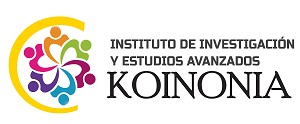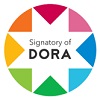Fortalecimiento de las estrategias didácticas para activar el desarrollo de los procesos de pensamiento
Resumen
El objetivo general de la presente investigación fue describir el fortalecimiento de las estrategias didácticas para activar el desarrollo de los procesos de pensamiento. El desarrollo de la investigación, se realizó desde la perspectiva cuantitativa, de tipo descriptiva y se complementó por un diseño documental-bibliográfico. La información fue extraída de los diferentes artículos arbitrados, trabajo de grado, entre otros. Se concluye que, el crecimiento de los procesos de pensamiento es ventajoso porque le permite a la persona ampliar diversas habilidades que utiliza en su día a día, capacitándolo para actuar, pensar y crear, aumentando capacidades y habilidades desde una edad temprana, desde la didáctica y los planes de formación incrementando el pensamiento lógico, crítico, creativo y matemático.
Descargas
Citas
Celi Rojas, S. Z., Catherine Sánchez, V., Quilca Terán, M. S., y Paladines Benítez, M. del C. (2021). Estrategias didácticas para el desarrollo del pensamiento lógico matemático en niños de educación inicial. [Didactic strategies for the development of mathematical logical thinking in early childhood education]. Horizontes. Revista De Investigación En Ciencias De La Educación, 5(19), 826–842. https://doi.org/10.33996/revistahorizontes.v5i19.240
Delgado, C. (2021). Estrategias didácticas para fortalecer el pensamiento creativo en el aula. Un estudio meta-analítico. [Didactic strategies to strengthen creative thinking in the classroom. A meta-analytical study]. Revista Innova Educación, 4(1), 51–64. https://doi.org/10.35622/j.rie.2022.01.004
Jaimes Peñaloza, C. (2021). Implementación de Estrategias Didácticas para el Desarrollo de la Habilidad en el Pensamiento Crítico en niños en Edad Escolar de 9 a 12 años en un Ámbito de Estudio Extraescolar. [Implementation of Didactic Strategies for the Development of Critical Thinking Skills in School-Age Children from 9 to 12 years of age in an After-School Study Environment].Tesis de Grado. Universidad Nacional Abierta. Recuperado de: https://n9.cl/vx3tm
Jama Zambrano, V., y Suárez Vélez, H. (2015). Estrategia metodológica para el desarrollo del pensamiento a través de los niveles de lectura. [Methodological strategy for the development of thinking through reading levels]. MEDISAN, 19(7), 861-867. Recuperado de: https://n9.cl/iwnpn6
Martínez, C. (2019). Investigación descriptiva: definición, tipos y características. [Descriptive research: definition, types and characteristics]. Recuperado de: https://n9.cl/3tqk7
Núñez-Lira, L., Gallardo-Lucas, D., Aliaga-Pacore, A, y Díaz-Dumont, J. (2020). Estrategias didácticas en el desarrollo del pensamiento crítico en estudiantes de educación básica. [Didactic strategies in the development of critical thinking in elementary school students].Revista Eleuthera, 22 (2), 31-50. https://doi.org/10.17151/eleu.2020.22.2.3
Palella Stracuzzi, S. y Martins Pestana, F. (2012). Metodología de la investigación cuantitativa. [Quantitative research methodology]. Fondo editorial de la Universidad Pedagógica Libertador. Caracas, Venezuela.
Polania Santana, J. C., Rivera Castro, N., & Luna Díaz, V. O. (2022). El aprendizaje cooperativo, una estrategia didáctica para el fortalecimiento en habilidades básicas del pensamiento crítico mediado por la enseñanza del inglés. Un estudio en cuatro escuelas rurales de Cundinamarca con estudiantes de educación básica. [Cooperative learning, a didactic strategy for strengthening basic critical thinking skills mediated by the teaching of English. A study in four rural schools in Cundinamarca with elementary school students].Tesis de Maestría, Universidad de la Salle. Recuperado de: https://n9.cl/5khezd
Quintero, V. L., Palet, D. J. E. A., y Olivares, D. S. L. O. (2017). Desarrollo del pensamiento crítico mediante la aplicación del Aprendizaje Basado en Problemas. [Development of critical thinking through the application of Problem Based Learning]. Psicología Escolar E Educacional,21(1),65–77. https://doi.org/10.1590/2175-3539201702111072
Silva Bustos, A. y Silva Bustos, M. (2020). Estrategias didácticas para el Fortalecimiento del Pensamiento Crítico de Ciclo Dos y Tres en Dos Instituciones Educativas Distritales de Bogotá D.C. [Didactic Strategies for the Strengthening of Critical Thinking in Cycle Two and Three in Two District Educational Institutions in Bogotá D.C.]Tesis de Maestría. Recuperado de: Fundación Universitaria Los Libertadores. Recuperado de: https://n9.cl/98xix
Silva-Manrique, M., Herrera-Montero, J., y Carvajal-Martínez, R. (2021). Modelo de Estrategias Didácticas para promover el pensamiento superior. [Model of Didactic Strategies to promote higher-level thinking].Ciencia Latina Revista Científica Multidisciplinar, 5(5), 9091-9110. https://doi.org/10.37811/cl_rcm.v5i5.976
Derechos de autor 2023 Martha Cecilia Yumi-Cutiupala, Zila Isabel Esteves-Fajardo

Esta obra está bajo licencia internacional Creative Commons Reconocimiento-NoComercial-CompartirIgual 4.0.
CC BY-NC-SA : Esta licencia permite a los reutilizadores distribuir, remezclar, adaptar y construir sobre el material en cualquier medio o formato solo con fines no comerciales, y solo siempre y cuando se dé la atribución al creador. Si remezcla, adapta o construye sobre el material, debe licenciar el material modificado bajo términos idénticos.
OAI-PMH URL: https://cienciamatriarevista.org.ve/index.php/cm/oai














